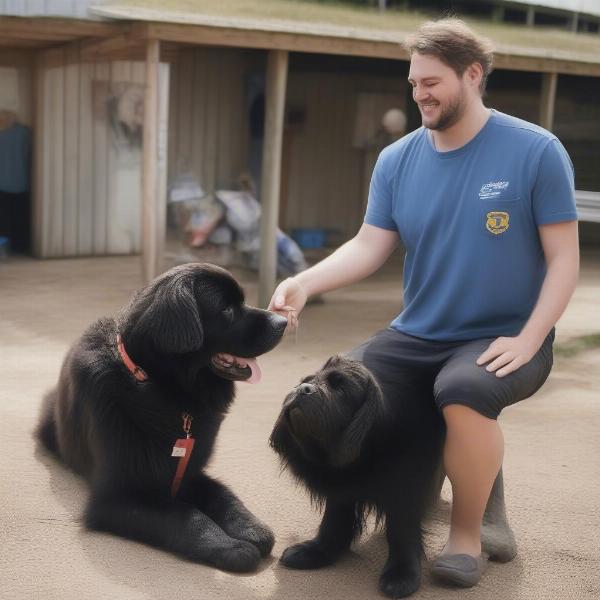Newfoundland dog rescue is a rewarding experience, connecting you with a loving, loyal companion. These gentle giants are known for their sweet temperaments and devotion to their families. Whether you’re an experienced dog owner or a first-timer, understanding the nuances of Newfoundland rescue is crucial for a successful adoption. This guide will explore everything you need to know about finding and welcoming a rescued Newfoundland into your home.
Why Choose Newfoundland Dog Rescue?
Rescuing a Newfoundland offers numerous benefits. You’re providing a second chance to a deserving dog, often saving them from uncertain circumstances. Plus, adopting an adult Newfoundland allows you to bypass the demanding puppy phase. You’ll often have a better understanding of the dog’s personality and any potential health issues upfront.
Finding a Newfoundland Rescue Organization
Locating a reputable Newfoundland rescue organization is the first step. Start by searching online for breed-specific rescues in your area or country. Reach out to multiple organizations to learn about their adoption process and available dogs. A good rescue will thoroughly vet potential adopters to ensure a good match. They’ll also be knowledgeable about the breed’s specific needs.
 A Newfoundland dog meeting potential adopters at a rescue shelter.
A Newfoundland dog meeting potential adopters at a rescue shelter.
Preparing Your Home for a Rescued Newfoundland
Newfoundlands are large dogs requiring ample space. Before bringing your new companion home, ensure you have a spacious living area and a securely fenced yard. These dogs are prone to shedding, so invest in good quality grooming tools and be prepared for regular brushing.
What to Expect When Bringing Your Newfoundland Home
Your rescued Newfoundland may need time to adjust to its new surroundings. Be patient and understanding during this transition period. Provide a quiet, safe space where they can retreat when feeling overwhelmed. Establish a consistent routine for feeding, exercise, and potty breaks. Positive reinforcement training is essential for building trust and establishing clear boundaries. sea dog
Common Challenges with Rescued Newfoundlands
Some rescued Newfoundlands may come with pre-existing health conditions or behavioral issues. Be prepared for potential vet visits and professional training if needed. Patience and consistency are key to helping your new companion overcome any challenges.
The Joys of Newfoundland Ownership
Despite the challenges, owning a Newfoundland is incredibly rewarding. These gentle giants are known for their unwavering loyalty, gentle nature, and love for their families. They’re excellent with children and make wonderful therapy dogs. With proper care and training, your rescued Newfoundland will bring years of joy and companionship to your life. black dog waverton
Conclusion
Newfoundland dog rescue provides a wonderful opportunity to welcome a loving and loyal companion into your life. By understanding the breed’s specific needs and being prepared for the adoption process, you can ensure a smooth transition for both you and your new furry friend. The unconditional love and companionship of a rescued Newfoundland will undoubtedly enrich your life for years to come. dog breeders in new brunswick canada large dog crossword clue
FAQ
- Are Newfoundlands good with children? Yes, Newfoundlands are generally excellent with children, known for their gentle and patient nature. is a porter a type of dog
- How much exercise does a Newfoundland need? Newfoundlands require moderate daily exercise, including walks and playtime.
- Do Newfoundlands shed a lot? Yes, Newfoundlands are heavy shedders and require regular grooming.
- Are Newfoundlands easy to train? While intelligent, Newfoundlands can be stubborn, so consistent positive reinforcement training is essential.
- What are common health issues in Newfoundlands? Hip and elbow dysplasia, heart conditions, and bloat are some common health concerns in Newfoundlands.
- How long do Newfoundlands live? The average lifespan of a Newfoundland is 8-10 years.
- What is the best food for a Newfoundland? A high-quality dog food formulated for large breeds is recommended for Newfoundlands.
ILM Dog is a leading international online resource dedicated to dog care and well-being. We offer expert advice on dog breeds, health, training, nutrition, and more. Whether you’re a seasoned dog owner or just starting your journey, ILM Dog provides the information you need to provide the best possible care for your canine companion. Contact us for personalized guidance and support: Email: [email protected], Phone: +44 20-3965-8624. Visit ILM Dog today!